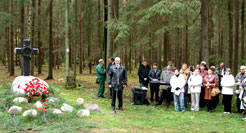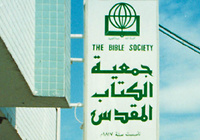Seventh-day Adventists and community members in St. Petersburg, Russia, dedicated a monument on October 7 to Adventists killed during the Great Purge political repressions under Soviet Leader Josef Stalin in the 1930s.
About 100 people, including a representative of the city's governor, gathered for the memorial at the Levashovsky Cemetery, according to Viktor Vitko, the Adventist Church's Public Affairs and Religious Liberty director for the church's Euro-Asia Division based in Moscow.
Vitko said newly released data revealed that about 40,000 people were secretly executed in St. Petersburg between 1937 and 1938. Five of the 140 Adventist victims have now been identified.
The cemetery remained classified by the Committee for State Security (KGB) until 1989, Vitko said.
"Hundreds of people were buried here," said Nikolay Smagin, pastor of the Adventist Church in St. Petersburg, during opening remarks.
Today we know just some names: Nikolay Arefiev, Grigory Kichaev, Teodor Kotuhov, Adam Pletser and Vladimir Teppone."
Vladimir Ivanov from the governor's public affairs department also gave words of condolence at the ceremony.
"I think this is of utmost importance to have that type of symbol now in Russia," said Michael M. Kulakov Jr., an associate professor of political science and philosophy at Columbia Union College near Washington D.C., in a telephone interview. "It's crucial to remember the price that millions of our countrymen paid for freedom of thought and expression."
Kulakov said such a monument was long overdue. "But before 1992 there was no possibility for Adventists or any religious group to build a monument in public, let alone get permission," Kulakov said.
Kulakov's father, Michael P. Kulakov, once banished to Siberia, was one of many Adventists who secretly continued the Adventist Church's work in Russia during communist rule. The younger Kulakov recalled finding secret compartments as a kid in his father's house in Kazakstan, one even hiding a 1929 edition of the Adventist Church's Bible study guide. In 1990 the elder Kulakov became the first president of the church's newly formed Euro-Asia Division based in Moscow.
The new monument in Levashovsky is significant, Kulakov said, because many younger Russians are far removed from the country's communist past. "They have no experiential knowledge of the degree of repression and suffering that Stalin's dictatorship brought to Russia," he said.
Between 1937 and 1938, more than 3000 church members were arrested for their participation in church activities, Vitko said.
In the Russian Federation there are now over 49.000 adult baptized Adventists. Approxiately 60.000 Adventist Christians are worshiping each week in some 660 churches in Russia.



